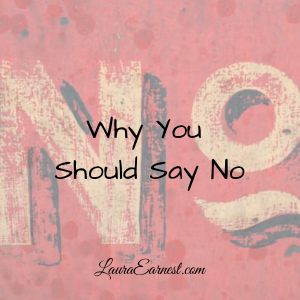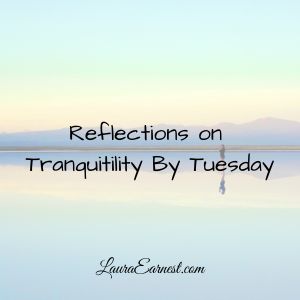Have you ever said yes when you wanted to say no? We’ve all done it, and it can lead to some far-reaching consequences.
Saying yes when you want to say no can lead us to build resentments as well as take us away from the things we really want to do.
What Triggered This
Between visiting my parents, re-assessing commitments at church and some tumult with one of my music teachers, I have had to say no quite a bit lately.
It’s not something I was particularly good at. I was raised to be a people-pleaser, and pressured into things when my response was no. I am grateful that the early-learned override of my no response didn’t get me into trouble when I did follow my peers.
Even now, well out of those late adolescent and early adult years, I still find it difficult to say no, especially when I have said yes in the past, or I just want to keep the peace.
Resentments
The problem with saying yes when you want to say no is that it can cause resentment to build. Anyone who has dealt with a recalcitrant and sulky child knows about this. “I’ll pick up my room, but I’m going to glare/stomp/give you attitude/be really slow/do the minimum.”
But as adults, at some level we know that it is our own actions that have led to doing the task we didn’t want to do and had a choice in. So it becomes a resentment: a silent feeling of displeasure that can sit in our guts and eat at us.
Expectations Are Pre-Meditated Resentments
I’ve heard it said that expectations are pre-meditated resentments. These work both ways: others expect us to do something we don’t want to do, or feel isn’t our job, and we build resentments. At the same time, we can build resentments when the other person doesn’t do something the way we believe or skips it altogether.
Both of these scenarios are damaging to ourselves: the resentments don’t hurt the other person. It just weighs us down and eats away at us. In a lot of ways, the same phrase about anger applies: it’s like drinking poison and expecting the other person to die.
What’s the Cost?
The cost of saying yes when we want to say no isn’t just in building resentments, though.
Everything that you say yes to means you are saying no to something else. Every time you say yes to something you don’t want to do, you are closing the door on something you do want to do.
Every time you say yes when you mean to say no costs you time, and squeezes your own desires and goals.
That’s a pretty high price to pay.
What Do You Want To Say No To?
I’ve been more aware of this tendency to say yes during this season of my life as I look at my current commitment load.
I realized that while serving on a certain committee at church served both the church and me three years ago, it no longer fits who I am, and I certainly wasn’t contributing anything to the group.
I realized that even though I enjoy singing, voice lessons were becoming a burden, trying to work through the difficulties of Zoom lessons when sound doesn’t match up.
I realized that sometimes the price for keeping the peace is too high, particularly when it means violating the rules I have made for myself to help me be my best self.
I realized that relationships work both directions, and if I am always the one who has to give way or bend then this is not a two-way relationship.
There are all the sorts of things that I am looking at in my life right now. I’m doing an activity-by-activity assessment, as well as a relationship assessment as well.
Assessing Your Current Yesses
If you want to do the same, how can you go about it? It just takes some self-assessment.
- For each activity or relationship in your life, ask yourself what you are getting out of it. Is it in line with your personal goals?
- Ask yourself what you are giving to the activity or relationship? Are you getting as much back?
- For each activity or relationship, ask yourself if it supports your best self and life?
Techniques to Say No
There are all sorts of ways to say no, even when you have been saying yes.
-
- For new commitments, ask for time to consider before giving your answer. Do this enough times and it will become habit. You can say, “I need to check my schedule” or “I need to think about it.” If someone pressures you once you have said this, you are probably going to end up being pressured to say more yesses later.
- You can step back with the condition that you will help on limited-time projects that your specific talents are needed for. I did this with the church committee. I explained I didn’t feel I was contributing, but if they had something come up that they needed my expertise on (happens twice a year), I would be happy to work with them for those things.
- You can back away entirely. With my voice teacher now being permanently situated in another state, I stopped taking voice lessons. I explained that I was working toward resuming in-person lessons and that I found Zoom difficult to work with.
- You can go over the scenarios where you are likely to say yes to keep the peace and decide if you need to say no; this then will allow you to find a way that is least likely to cause a dust-up.
- You can decide what you are willing to give to uneven relationships and remind yourself in the moment that it is a two-way street.
The Results of Honoring Your No
The results of doing this type of assessment as well as taking action to honor your personal No is going to open up a lot of things. It will give you back time to apply to your own goals as well as give you more room to be your best self.







